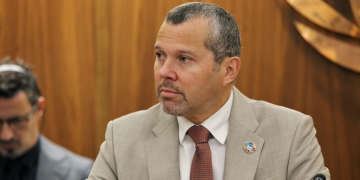Standard Club has laid out its vision to support its members’ sustainability goals with the launch of its first sustainability impact paper. The report “Planet | People | Performance,” describes the Club’s efforts to reduce the direct and indirect impact it has across areas of its operations and services.
Standard Club has adopted a strategy to support sustainability goals, including developing and using emerging technologies, supporting the offshore and renewables sector, supporting seafarer wellbeing and committing to helping members make a transition to greener energy solutions through its Alternative Fuels Working Group.
All the initiatives outlined in the report are aligned with seven of the United Nation’s 17 Sustainable Development Goals and are designed to support the club’s members by mitigating risks, boosting safety and supporting sustainable practices.
While the shipping industry has been discussing sustainability for more than a decade, insurers have only relatively recently considered the potential impact on their business
said Jeremy Grose, Standard Club’s Chief Executive.
One key element of the strategy is supporting seafarers’ well-being. The club helps its members to support seafarer well-being by sharing best practice, undertaking detailed research through its participation in the Seafarer Happiness Index and is a significant supporter of a number of seafarer charities.
Climate risk
Standard Club’s responses to climate change include:
- Continuously monitoring and analysing climate risk by identifying both physical and transitional climate risk exposures via a series of potential risk drivers and time horizons.
- Integrating climate change into all possible touchpoints – policies, thresholds, mitigation strategies, while monitoring capabilities and risk appetites, and quantifying climate-related scenarios.
- Providing information and resources via our proactive Alternative Fuels Working Group, so members and brokers can make informed decisions and choices in their decarbonisation journey.
- Promoting responsible ship recycling and waste management.
Marine casualty response/Claims management
Standard Club’s major casualty response provides fast, decisive action in the event of a major accident or an injury. The key benefits include:
- An immediate emergency response to marine casualties to safeguard life, health, livelihoods and the environment.
- Compensating legitimate claimants for damage, while giving paramount consideration to the environmental impact of each decision and seeking out environmentally-friendly solutions, wherever possible.
- Waste handling and wreck removal in an economical and environmentally-friendly manner.
- Information and insight.
- Encouraging industry dialogue about environmentally-friendly solutions when handling marine casualties and claims.
Alternative fuels
#1 Alternative Fuels Working Group (AFWG): This cross-function team comprises members from the club’s Underwriting, Claims and Loss Prevention divisions. It ensures it stays abreast of the latest developments, acquire all the information relevant to the club, and provide ongoing advice and guidance on this changing landscape.
#2 Advisory panel for Standard Club members (SAFAP): The SAFAP includes key professionals from the industry across all maritime fields with expertise in alternative fuels. The SAFAP works with the AFWG to share knowledge that will help ensure the club is ready to offer the protection and advice operators need when they begin using alternative fuels.
#3 Responsible ship recycling/waste management:
Standard Club has several measures in place and support tools to help operators, including:
- Providing operators with information and understanding so they can ensure their compliance with current applicable ship recycling laws and conventions during wreck removal operations.
- Promoting compliance with the Hong Kong Convention wherever possible.
- Insight and advice on meeting other waste guidelines, such as the ballast water management convention.
- Protecting the environment by avoiding the spread of toxic materials and waste from vessels during casualty management.
- Training and support for members on best practices and minimum requirements, including a range of guides available through our website.
- Continuous tracking of ship recycling-related queries.
In the meantime, ICS, the International Shipsuppliers & Services Association (ISSA), BIMCO and the International HazMat Association (IHMA) have collaborated to develop a new guide to help both shipowners and ship suppliers comply with both the current EU Ship Recycling Regulations (EUSRR) and the Hong Kong Convention on Ship Recycling (HKC) where ratification is anticipated next year.
Seafarer wellbeing
Standard Club’s support for seafarers includes:
- Seafarer Happiness Index: This quarterly survey of seafarers asks the same 10 questions, enabling to capture the current mood across a range of issues. Following each report, it provides comments and publish guidance for operators on how best to address any red flags.
- Seafarer wellbeing poster campaign: Posters raise industry and operators’ awareness of the critical importance of mental and physical wellbeing of crews by targeting the issues that have the most significant impact – healthy eating, fitness, mental wellbeing, and social wellbeing.
- Reviewing our Seafarer Wellbeing Guide: First published in 2018, it forms part of the club’s ongoing collection of articles and guides under the Seafaring Wellbeing umbrella. The revised guide will be available at the end of 2022 and highlights the factors that contribute most to seafarers’ wellbeing.
- Signatory of The Neptune Declaration: Created with the express aim to promote the wellbeing of seafarers and address the crew change issue during the pandemic.
- Dedicated Pre-employment Medical Examination: This programme is available in five countries and goes beyond the mandatory required medical fitness testing. The PEME specifically focuses on detecting underlying chronic illness before crew join the vessel, ensuring seafarers are fit to serve at sea.
- Seafarer Wellbeing webinar series: Run throughout the pandemic, the club spoke to wellbeing organisations, industry experts – and vitally, crew members – to reveal the pressures on seafarers working during the height of Covid-19. These first-hand accounts of issues including lack of access to health care professionals, essential supplies, shore leave, and the crew change crisis provide essential learnings for our industry to act upon.
- Support of several maritime charities, including Mission to Seafarers, Sailors’ Society – Wellness Campaign, Stella Maris, and ISWAN.



























































